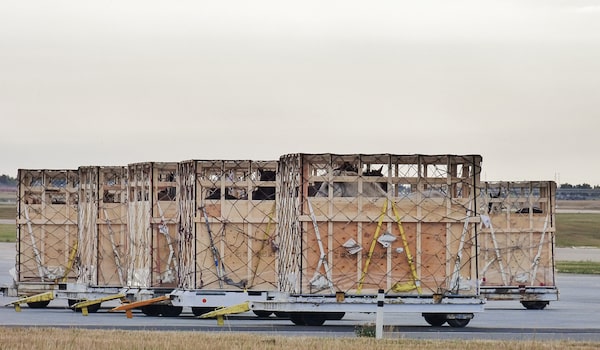
Horses in crates on the tarmac at Calgary International Airport. The horses are headed to Japan for possible slaughter.Canadian Horse Defence Coalition/Handout
Jann Arden is an award-winning musician and actor. Jessica Scott-Reid is a freelance journalist and animal advocate based in Winnipeg.
Ahead of the most recent federal election, as Justin Trudeau and his Liberal party were racing toward voting day, campaign promises were hitting the news cycle fast and furiously. Banning the export of live horses for slaughter was an easy appeal. Most Canadians love horses and the thought of ending the heinous practice of loading these sensitive, skittish animals onto gruelling long-haul flights only to be slaughtered in a foreign country was enough to inspire many Canadians to vote red.
We did.
The Liberals won. But here we are more than a year later and live horses are still being exported from Canada, as recently as this month, to be cut up for sashimi in Japan and leaving many of us who voted with great hope feeling duped.
Many Canadians may be surprised to learn that this country breeds and farms horses on barren feedlots in Alberta for the sole purpose of meat production. While the United States essentially outlawed horse slaughter in 2006, when Congress passed the Horse Slaughter Prevention Act, here in Canada we continue to butcher horses for profit. In 2021, Canadian producers sold about $23-million worth of fresh, chilled or frozen horse, donkey and mule meat, mainly to Japan, Switzerland, France, Italy and the United States, making us one of the largest producers of such meat in the world.
Other horses are selected for live export to Japan to be slaughtered and eaten mainly as a raw delicacy. In the past five years, more than 14,500 horses worth almost $93-million have been flown from Edmonton, Calgary and Winnipeg to Japan.
Witnessing the loading up of these animals – confused, frightened and already exhausted from long ground trips – onto Korean Air cargo planes is an experience that stays with you for life. At the James Richardson Airport in Winnipeg, animal activists recently discovered that a new barrier had been erected right where they had previously witnessed and documented the disturbing loading process.
Crammed two to four at a time in wooden crates, the horses kick and vocalize, all under the cover of night and often while having to spend additional hours waiting on the tarmac, regardless of whether it is -35 or 35 Celsius outside. When the horses eventually depart, Canadian regulations allow a travel time of up to 28 hours, including land and air transportation, as well as unloading and loading, without any food or water.
This is a sinister facet of Canadian agriculture. We have a saying in the music business that you’re only as good as the worst guy in your band. Horse farming is the bar to which Canadian agriculture lowers itself. Other farmers nationwide should be embarrassed and ashamed of this corner of the industry, and should be inspired to join our efforts to hold the Liberal government to its promise to put at least one aspect of this business to an end.
Since the federal election, Agricultural Minister Marie-Claude Bibeau has been mandated by the Prime Minister to enact the ban on exporting live horses from Canada for slaughter. But still nothing has been done. Instead, Ms. Bibeau’s department recently told The Globe and Mail in a statement that it was “in the early stages of analyzing the commitment and is engaging with key stakeholders.”
The minister is in the “early stages” 16 months after the promise was made and is “engaging with stakeholders” – meaning horse farmers, not animal advocates. This was not the assignment. The assignment was to end these exports, full stop. Since the Prime Minister sent his mandate letter to Ms. Bibeau, more than 2,300 more horses have been exported to Japan.
Of course, we know election promises are not guarantees; so many are made without ever being addressed. But this one was added at the last minute to appeal to a very specific problem, which was brought to light by grassroots activists including the Canadian Horse Defence Coalition, to inspire compassionate voters.
On Aug. 30, 2021, the Conservative Party presented its campaign commitments to ban puppy mills and end the cosmetic testing of animals. On Sept. 1, 2021, the Liberals publicly promised to ban the export of live horses for slaughter. We can’t help but wonder whether the strategy of including the horses was just that – a strategy – rather than a real commitment.
Prime Minister Trudeau must do better. He made a promise and we, along with countless other Canadians, expect him to keep that promise. Now.